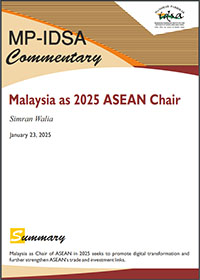Malaysia as 2025 ASEAN Chair
- January 23, 2025 |
- IDSA Comments
Among Malaysian Prime Minister Anwar Ibrahim’s key challenges will be the ongoing US–China trade battle, which may intensify further with President Donald Trump’s return. Maritime conflicts in the South China Sea continue to be challenging. ‘China+1’ strategy to diversify supply chains away from China may further polarise ASEAN member nations.
Malaysia’s position as a claimant state and the coordinator for ASEAN–China relations imply that Malaysia has a stake in further advancing the negotiations with Beijing through the Code of Conduct.[iv] Protecting Malaysia’s sovereignty, sovereign rights and interests in its maritime areas in the South China Sea is a top priority for the Ibrahim government. Other claimant states, especially the Philippines and Vietnam, have been more forceful in protecting their territorial claims.
Myanmar is another big challenge for Malaysia, where a full-fledged civil conflict broke out following a military coup in 2021.[v] ASEAN’s reaction so far, based on the so-called Five-Point Consensus, has been criticised as inadequate. It was adopted in April 2021 and called for the immediate end to violence, the appointment of a special ASEAN envoy, constructive dialogue between all parties to find a peaceful solution and provision of humanitarian aid.[vi]
Malaysia has expressed willingness to act as a mediator and engage in negotiations with the various parties involved in the Myanmar conflict. Given the comparatively cordial ties between Kaula Lumpur and Beijing, and the strengthened relationship between the Myanmar junta and Beijing, Malaysia as ASEAN Chair could be better placed perhaps to play a constructive role.
Malaysia’s ASEAN chairmanship will also have to engage with the surge of new leadership throughout Southeast Asia. Paetongtarn Shinawatra of Thailand and Lawrence Wong of Singapore took office in 2024. Ferdinand Marcos Jr. of the Philippines, and Sonexay Siphandone of Laos came to power in 2022, as did Ibrahim. In 2023, Hun Manet became the new leader of Cambodia, while in October 2024, Prabowo Subianto became the president of Indonesia. Domestically, Prime Minister Anwar is well-known for his ability to balance Malaysia’s unity government, which bridges the ideological divide between multicultural coalitions and Malay nationalists. He will be expected to bring these skills to engage with Southeast Asia’s new leaders to execute the ASEAN agenda.
Malaysia aims to finalise talks and negotiations on the ASEAN Community Vision 2045 and the ASEAN Digital Economy Framework Agreement (DEFA).[vii] The ASEAN Community Vision 2045 was introduced in 2020 as part of the ongoing efforts to strengthen and deepen the integration of ASEAN member states. It outlines the strategic direction and aspirations for the region, aiming to foster stronger economic, political and socio-cultural integration among its member states by 2045.
The ASEAN Digital Economy Framework Agreement (DEFA) was endorsed in 2021 during the 37th ASEAN Summit. It aims to promote digital transformation and create a conducive environment for the digital economy in Southeast Asia. It seeks to enhance the integration of ASEAN economies in the digital space, facilitate cross-border digital trade, and foster a unified and collaborative approach to digitalisation across the region.
Fast-tracked negotiations on DEFA are anticipated to be completed by end of 2025. By 2030, the DEFA is expected to boost ASEAN’s GDP by about US$ 2 trillion.[viii] In order to ensure that ASEAN can capitalise on scientific, technological and innovative advancements as well as the advantages of digital transformation and emerging technologies, Malaysia can be expected to support measures to further boost intra-ASEAN trade, which stood at around 22 per cent in 2023.[ix] Malaysia, Indonesia, Thailand and Vietnam have also formally joined BRICS, which could help accelerate ASEAN’s developmental agenda.
ASEAN, meanwhile, has been the top beneficiary of foreign direct investment (FDI) among developing regions.[x] Despite a general decrease in global flows, FDI inflows to ASEAN hit a record US$ 230 billion in 2023. As Ibrahim pointed out in a December 2024 meeting with ASEAN’s Secretary General, ASEAN’s youthful and vibrant populace cannot profit from the digital economy and more market access without greater economic cooperation.
Timor-Leste’s admission as the newest full member of ASEAN is also a possibility during Malaysia’s chairship. In 2022, Timor became the 11th ASEAN member to be invited as an observer. It has not been accepted as a full member yet due to concerns about its level of development, economic capacity and institutional readiness to meet ASEAN’s membership standards.
Malaysia can be expected to strive for a more unified, forward-thinking ASEAN with strong and robust procedures to better manage the challenges and opportunities. ‘The ASEAN Way’ will necessitate working together to address transboundary problems including cybercrime, human trafficking, haze pollution and the growing Rohingya refugee population in Malaysia.
Views expressed are of the author and do not necessarily reflect the views of the Manohar Parrikar IDSA or of the Government of India.
[i] “Symbolic Handing Over of the 2025 Chairmanship to Malaysia”, Ministry of Foreign Affairs, Malaysia, 11 October 2024.
[ii] “Supporting Malaysian-ASEAN Chairmanship 2025: A Year of Unity and Progress”, United Cities and Local Governments Asia-Pacific, 28 November 2024.
[iii] “Malaysia Assumes Chair of ASEAN, Vowing Unity”, Khmer Times, 3 January 2025.
[iv] Mohd Harith Ramzi, “Why 2025 is a Make or Break Year for ASEAN Unity”, The Diplomat, 25 October 2024.
[v] Antonio Graceffo, “Myanmar Civil War: New Season, New Breakthroughs?”, Geopolitical Monitor, 14 November 2024.
[vi] Adinda Khaerani Epstein, “ASEAN Still Torn Over Security Challenges”, GIS Reports, 2 October 2024.
[vii] “Malaysia Aims to Conclude Digital Economy Framework Agreement This Year”, ASEAN 2025, 8 January 2025.
[viii] Kenny Teng, “Malaysia Urges ASEAN Member States to Finalise DEFA This Year”, Bernama, 16 January 2025.
[ix] Xirui Li, “ASEAN’s Trade-off Between Economic Nationalism and Development”, East Asia Forum, 24 February 2024.
[x] “ASEAN Investment Report 2024”, UN Trade and Development, 8 October 2024.






